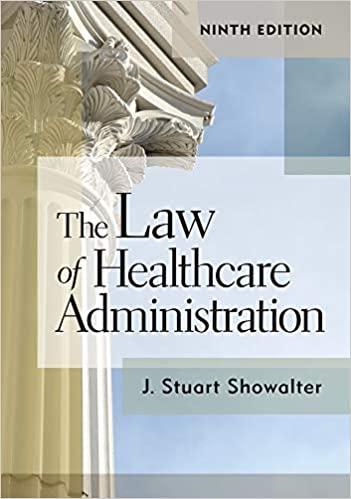Question
In 1928, during a period of fervent Christian Fundamentalism, the Arkansas state legislature passed a statute prohibiting the teaching of human evolutionary theory in public
In 1928, during a period of fervent Christian Fundamentalism, the Arkansas state legislature passed a statute prohibiting the teaching of human evolutionary theory in public schools. The law made it unlawful for any teacher or other instructor in any university, college, public school or other institution of the state to teach the theory or doctrine that mankind ascended or descended from a lower order of animals. Teachers or professors who violated the law were subject to fines and dismissal by the state.
Susan Epperson, a 10th grade biology teacher in Little Rock, sued the state of Arkansas, challenging the constitutional authority of the state to enact such a restriction on religious grounds. In Epperson v Arkansas (1968) the court sided unanimously 9-0 with Epperson stating that the state government may not require curricula to align with the views of any particular religion. The court stated "The overriding fact is that Arkansas' law selects from the body of knowledge a particular segment which it proscribes for the sole reason that it is deemed to conflict with a particular religious doctrine; that is, with a particular interpretation of the Book of Genesis by a particular religious group. [T]he state has no legitimate interest in protecting any or all religions from views distasteful to them."
- Identify a constitutional clause that is common to both Engel v Vitale (1962) and Epperson v Arkansas (1968).
- Explain how the facts of Engel v Vitale and the facts of Epperson v Arkansas led to a similar holding in both cases.
- Explain how an interest group could use the decision in Epperson v Arkansas to advance their agenda.
Gregory Lee "Joey" Johnson, then a member of the Revolutionary Communist Youth Brigade, participated in a political demonstration during the 1984 Republican National Convention in Dallas, against the Reagan Administration and certain companies based in Dallas. When the demonstrators reached Dallas City Hall, Johnson poured kerosene on an American flag and set it on fire while the crowd chanted and sang phrases critical of the United States and the Reagan Administration. No one was hurt, but some witnesses to the flag burning said they were extremely offended. Johnson was charged with violating a Texas law that prohibited the "desecration of a venerated object." He was convicted, sentenced to one year in prison, and fined $2,000.
Johnson challenged the constitutionality of the law he was charged under, claiming it was a violation of his civil liberties. In the case Texas v Johnson (1989) the court sided 5-4 with Johnson stating that the government cannot limit civil liberties based solely on the venerated and honored nature of the American Flag. "Occurring as it did at the end of a demonstration coinciding with the Republican National Convention, the expressive, overtly political nature of the conduct was both intentional and overwhelmingly apparent." The court concluded that, while "the government generally has a freer hand in restricting expressive conduct than it has in restricting the written or spoken word," it may not "proscribe particular conduct because it has expressive elements."
- Identify a Constitutional clause that is common to both Tinker v Des Moines (1969) and Texas v Johnson (1989)
- Explain how the facts of Tinker v Des Moines and the facts of Texas v Johnson led to a similar holding in both cases
- Explain how the court's decision in Texas v Johnson would affect laws in 48 states that prohibited the intentional desecration of the flag or other national symbols
Step by Step Solution
There are 3 Steps involved in it
Step: 1

Get Instant Access to Expert-Tailored Solutions
See step-by-step solutions with expert insights and AI powered tools for academic success
Step: 2

Step: 3

Ace Your Homework with AI
Get the answers you need in no time with our AI-driven, step-by-step assistance
Get Started


